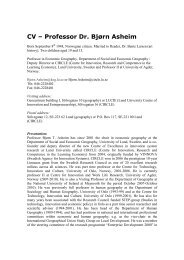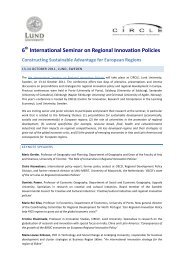REPORT 2012/05 Start av regionala investeringsfonder ... - circle
REPORT 2012/05 Start av regionala investeringsfonder ... - circle
REPORT 2012/05 Start av regionala investeringsfonder ... - circle
Create successful ePaper yourself
Turn your PDF publications into a flip-book with our unique Google optimized e-Paper software.
SUMMARY<br />
This is the first annual on-going evaluation report on the ende<strong>av</strong>our comprising the twelve<br />
regional co-investment funds with nationwide coverage that are run in the form of projects<br />
financed by the European Regional Development Fund (ERDF) and co-financed by the regions.<br />
Behind this ende<strong>av</strong>our lies an interest of the European Commission and national and regional<br />
actors to work on revolving financing instruments in the form of equity capital with the aim of<br />
addressing an identified lack of capital to finance small and medium enterprises (SMEs) with<br />
ambitions of growth. The funds were established in 2009 and their objective is to improve access<br />
to equity capital for SMEs in Sweden. The funds are operated in project form and are accordingly<br />
referred to as fund projects. The period of the project extends from 1 January 2009 to 31<br />
December 2014. The project owner shall present a final report on the use of the ERDF funding in<br />
the project not later than 31 March 2015. The ERDF funding that has not been invested in<br />
portfolio companies at least once by 31 December 2014 must be repaid to the European<br />
Commission. Available funding that is not required to be repaid stays in the region after the final<br />
report. During the project period, funding can be redistributed from the fund projects to other<br />
structural fund projects.<br />
On-going evaluation is tied to this ende<strong>av</strong>our, meaning that there will be continuous follow-up<br />
and evaluation of its progress, which will contribute to learning with regard to implementation<br />
and results. In this assignment, the on-going evaluation shall answer two overall questions:<br />
1. Can the funds act as good venture capitalists given their mission, structure and regional<br />
conditions?<br />
2. Can this kind of fund provide the results and effects in society expected by the EU and the<br />
Government (through the managing agency)?<br />
This on-going evaluation shall also contribute to a broader discussion in society concerning public<br />
investment funds as an instrument to increase the supply of capital for SMEs. The annual reports<br />
shall present and discuss the implementation and results of the projects and analyse relevant<br />
questions concerning the funds’ activities. This first report focuses on the funds’ mission, design<br />
and goal structure, how the funds h<strong>av</strong>e commenced with their activities and what the most<br />
important success factors are for the funds’ work and their challenges ahead. Besides this ongoing<br />
evaluation, the Swedish Agency for Growth Policy Analysis (Growth Analysis) is working on<br />
behalf of the Ministry of Enterprise, Energy and Communications on a broader evaluation which<br />
includes research surveys, international experience of venture capital investments and impact<br />
evaluation. Together, this on-going evaluation and the evaluation conducted by Growth Analysis<br />
will increase understanding of ERDF-financed co-investment funds as an instrument in the<br />
Swedish context and increase understanding as to whether use of these kinds of funds in Sweden<br />
will be suitable in the future.<br />
International research shows that this kind of co-investment venture capital fund programme is<br />
difficult to design and must consequently be run as an experimental activity where new solutions<br />
are gradually developed. Moreover, the structure must be adapted to the country’s regulatory<br />
and cultural context and the task of on-going evaluation is to get involved and generate<br />
knowledge of how such factors affect the activities of the funds. This report is the first in a series<br />
of reports that shall gradually increase knowledge of how all parties involved, including the<br />
agency in charge of the programme (Swedish Agency for Economic and Regional<br />
Growth/Tillväxtverket) works with and influences the implementation of the ende<strong>av</strong>our in<br />
Sweden.<br />
Gordon Murray notes in a chapter in a book from 2007 that the public sector has historically<br />
played an important role in the development of venture capital markets in various countries.<br />
Nearly all countries that h<strong>av</strong>e well-developed venture capital markets today (including the U.S.,<br />
the UK and Israel) h<strong>av</strong>e made extensive public efforts directed at building them up. At the same<br />
time, in his latest book with the illustrative title Boulevard of Broken Dreams: Why Public Efforts<br />
to Boost Entrepreneurship and Venture Capital H<strong>av</strong>e Failed - and What to Do about It, Josh<br />
1-2






